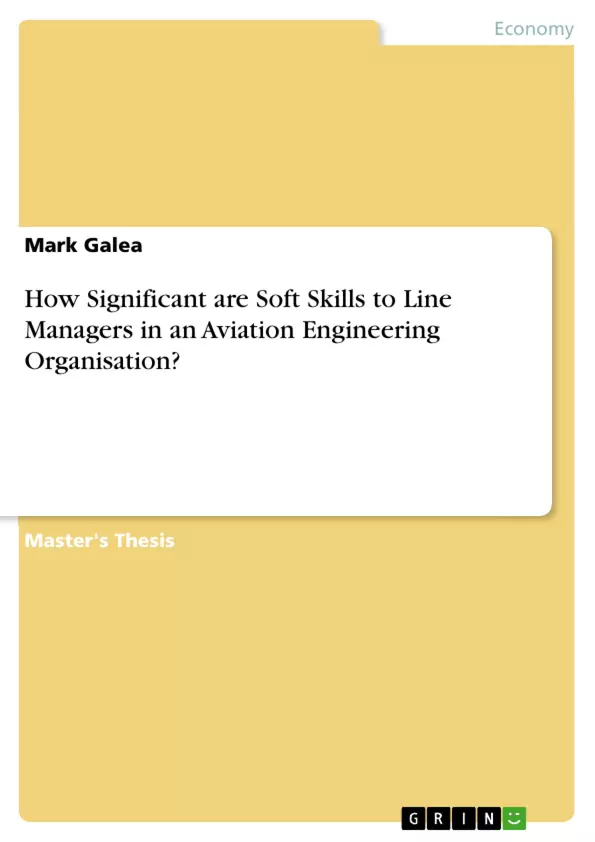Aviation engineering is a highly technical line of work, and most certainly a high level of technical skills, also known as hard skills, are required for technically maintaining aircraft. However, this research study investigates a group of aircraft engineers and their respective line managers, who themselves are also aircraft engineers, to outline the current perception of soft skills and its significance to these line managers in this particular aviation engineering organisation. Following this investigation, it is the objective of this study to elicit possible beneficiary recommendations for further recognition of the aviation engineering profession's esteem.
The aviation engineering industry has been evolving for over a century to keep up with technological improvements and the professional culture of the personnel working in this industry requires a continuous adaptation to changes in business requirements. Engineering in aviation has been proven to be a direct link in the aviation safety chain, however, in due to the fact that this line of work is often executed in restricted areas of airports, it is secreted from the general public, and is therefore very poorly promoted and is very rarely a research attraction for social scientists.
The access available to the author as an aircraft engineer within the researched organisation, grants the possibility to carry out primary research on the subject group of employees. Literature review findings concerning five soft skill attributes and their relation to both engineering in general, as well as aviation engineering, are investigated to discover their relation to front line management in this organisation, and to expose if these skills can be related to aviation safety.
Several findings emerged through this qualitative research. A deprivation of soft skills awareness in a formal manner is evident as training is omitted. A promotion deficiency together with an isolation of the operations of the aviation engineer's profession is leading to an underprivileged estimation, and a degradation in the aretefact cultural level. Positive outcomes are also exposed with regards to regular use of physical communication and the tendency of self-interest towards soft skills development in an experiential manner.
Conclusions imply that a further development of soft skills among the group in study shall have an indirect impact on the end product of this team, positively effecting safety.
Inhaltsverzeichnis (Table of Contents)
- Abstract
- ACKNOWLEDGEMENTS
- TABLE OF FIGURES
- CHAPTER 1 - INTRODUCTION
- Introduction To The Study
- The Objectives To This Research
- The Organisation In Study
- Problem Statement
- CHAPTER 2 - LITERATURE REVIEW
- Overview
- Identification of Soft Skill Attributes
- Emotional Intelligence
- Communication
- Written Communication
- Communication Meetings
- Leadership Skills
- Transformational leadership dimensions
- Transactional leadership dimensions
- Leadership Development
- The dark side of leadership
- Personality
- Personality Testing
- Ethics, Engineering Professionalism & Commercial Aircraft Maintenance
- Summary
- CHAPTER 3 - RESEARCH METHODOLOGY
- Overview
- Definition of Research
- Types of Research
- Qualitative vs. Quantitative Research Approaches
- Quantitative Research
Zielsetzung und Themenschwerpunkte (Objectives and Key Themes)
This dissertation investigates the significance of soft skills for line managers in a local aviation engineering organization. The research aims to explore the connection between soft skills and aviation safety, as well as to identify any potential gaps in training and development within the organization.
- The role of soft skills in aviation engineering and management.
- The impact of soft skills on aviation safety.
- Training and development needs for soft skills within the organization.
- The cultural context and its influence on soft skill development.
- Potential areas for improvement in the organization's approach to soft skills.
Zusammenfassung der Kapitel (Chapter Summaries)
Chapter 1 provides an introduction to the study, outlining the objectives and problem statement. Chapter 2 delves into the literature review, examining five key soft skill attributes - Emotional Intelligence, Communication, Leadership Skills, Personality, and Ethics - in relation to engineering and aviation engineering, with a focus on their relevance to front-line management. Chapter 3 presents the research methodology, outlining the qualitative approach employed and providing a definition and classification of research types.
Schlüsselwörter (Keywords)
The main keywords and focus topics of the text are: soft skills, aviation engineering, line managers, aviation safety, emotional intelligence, communication, leadership skills, personality, ethics, training and development, qualitative research, research methodology.
Frequently Asked Questions
Why are soft skills important for aircraft engineers?
While technical skills are vital, soft skills improve communication and leadership, which are directly linked to aviation safety and team efficiency.
What are the key soft skill attributes identified in the study?
The study focuses on Emotional Intelligence, Communication, Leadership Skills, Personality, and Ethics.
How does emotional intelligence relate to aviation management?
Emotional intelligence helps line managers handle high-pressure situations and effectively manage interpersonal relationships within technical teams.
Is there a training gap regarding soft skills in aviation engineering?
Yes, the research found a deprivation of formal soft skills awareness and training, with many engineers relying on experiential learning instead.
What impact does soft skill development have on aviation safety?
Better communication and leadership reduce human error, which is a critical factor in maintaining the aviation safety chain.
- Quote paper
- Mark Galea (Author), 2014, How Significant are Soft Skills to Line Managers in an Aviation Engineering Organisation?, Munich, GRIN Verlag, https://www.grin.com/document/308854



